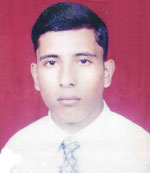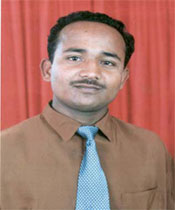Related Links
Case Updates
Krishna Adhikari
 On 6 June 2004, Krishna Prasad Adhikari, a resident of Fujel village of Gorkha District, was murdered in Chitwan District by Maoist cadres. Krishna Prasad was visiting his grandparents after having taken the SLC examinations, and he was abducted from Bakullahar Chowk by men who came on a motorcycle ...
On 6 June 2004, Krishna Prasad Adhikari, a resident of Fujel village of Gorkha District, was murdered in Chitwan District by Maoist cadres. Krishna Prasad was visiting his grandparents after having taken the SLC examinations, and he was abducted from Bakullahar Chowk by men who came on a motorcycle ... Maina Sunuwar
 Around 6 am on February 17, 2004, a group of RNA soldiers arrested Ms
Maina Sunuwar, a 15-year-old schoolgirl of Kharelthok VDC-6, Kavre
district. She disappeared since her arrest. Her family members, with
support from villagers and school where Maina was a student, visited
detention centers ...
Around 6 am on February 17, 2004, a group of RNA soldiers arrested Ms
Maina Sunuwar, a 15-year-old schoolgirl of Kharelthok VDC-6, Kavre
district. She disappeared since her arrest. Her family members, with
support from villagers and school where Maina was a student, visited
detention centers ... Sanjeev Kumar Karna
 Sanjeev Kumar Karna was one among the 11 persons arrested on October 8, 2003. On that fateful day, they had gone to attend a picnic program organized by the students at a place called Kariyachauri VDC-4, and from picnic, they went to Kataiya Chowri Area of Dhanusha district where they ate some food ...
Sanjeev Kumar Karna was one among the 11 persons arrested on October 8, 2003. On that fateful day, they had gone to attend a picnic program organized by the students at a place called Kariyachauri VDC-4, and from picnic, they went to Kataiya Chowri Area of Dhanusha district where they ate some food ... Arjun Bahadur Lama
Hari Prasad Bolakhe
Sarala Sapkota
Birendra Shah
Bishwanath Parajuli, Tom Nath Poudel and Dhan Bahadur Tamang
Chot Nath Ghimire and Shekhar Nath Ghimire
Bhauna Tharu
The recent decision of the District Court in Dailekh could help to speed up TJ process in Nepal: Advocacy Forum welcomes the decision of the District Court of Dailekh
Radio journalist, Dekendra Thapa was abducted by the then rebel group, the Nepal Communist Party Maoist on 26 June 2004 and tortured to death. After four years of relentless efforts of the family including the HRDs and journalists, his dead body was exhumed on 26 June 2008 from Dwari VDC-1, Dailekh with technical assistance from the National Human Rights Commission.
His wife Laxmi Thapa had logged a First Information Report (FIR) in 2008. However, police conducted no investigation on the case arguing that a political consensus was needed for them to allow investigation in conflict-era cases as they were instructed that those cases will be handled by to be established transitional justice (TJ) mechanism.
His wife had challenged the lack of investigation on the case on 12 December 2012 by filing a writ of mandamus in Appellate Court Surkhet, refusing to accept the argument that to be established TRC will investigate the case.
However, after the arrest of Kumar Lama in the UK under the universal jurisdiction in early 2013, police and prosecutor in Dailekh had emboldened themselves and arrested 5 alleged perpetrators, namely Lacchiram Gharti Magar, Nirak Bahadur Gharti Magar, Bir Bahadur KC alias Birasat, Harilal Pun Magar, Jaya Bahadur Shahi while four others Arun alias Bam Bahadur Khadka, Mukti alias Bam Bahadur Khadka, Keshav Khadka and Bhaktiram Lamichhane were still absconding. The persecutor indicted 9 of them for murder.
Lacchiram Gharti, one of the arrested, provided his statement to the police and the public prosecutor saying that he and others had buried Dekendra alive after severely torturing him as per the party leader’s instruction. He further added that he wanted to unburden himself by revealing the truth and facing the charges.
However, on 9 January 2013, the then Prime Minister Baburam Bhattarai and the then-Attorney General of Nepal, Mukti Pradhan had directed the police to immediately halt all investigations into the case. They claimed that these cases would be dealt with by a Truth and Reconciliation Commission (TRC) and that criminal proceedings in conflict-era cases would threaten the peace process.
These acts of the Prime Minister and the Attorney General were challenged in the Supreme Court as obstruction of justice by filing a writ of mandamus. The writ also sought an order against these authorities not to obstruct justice and an order against the police and prosecutor in the district to move ahead with the prosecution. The Supreme Court reinforced that justice cannot be in a vacuum; the state cannot prevent access to justice for victims stating that yet-to-be established TJ mechanisms, whose mandates were not even clear, will provide them justice. The order required police and prosecutor to investigate and prosecute the case. This resulted in filing of the murder charges against the 9 accused, where five of them were arrested, four including the primary perpetrators remained absconded. Family members and human rights activists alleged that those absconders had received protection from the Maoist party, who was in Government at the time.
In December 2014, the District Court Dailekh convicted five of those arrested for abetting the murder. The court sentenced Nirak Gharti Magar, Harilal Pun and Jaya Bahadur Shahi to two years of imprisonment. Lachhiram Gharti Magar and Bir Bahadur KC were punished with one and a half years and one year of imprisonment respectively.
The lawyers representing the accused, including the ones provided by the then party in Government, the CPN- Maoists, argued that conflict-era cases need to be handled by the yet to be established TRC. They further argued the Comprehensive Peace Agreement (CPA) provides amnesty to Maoist cadre for conflict-era cases.
Two years ago, one of the absconders in the case, Arun alias Bam Bahadur Khadka was arrested and detained while awaiting trial. The district court on 12 December 2021 sentenced him to 20 years of imprisonment for murdering Dekendra Thapa. Mukti alias Bam Bahadur Khadka and Keshav Khadka have also been sentenced to 20 years’ imprisonment in absentia. Bhaktiram Lamichhane has received 3 years of imprisonment for abetting the murder.
Advocacy Forum has been accompanying family members in their quest for justice from the beginning and providing legal assistance in this case from the very beginning of filing the FIR with the Police. The Federation of Nepalese Journalists also regularly followed the case.
























Join Us